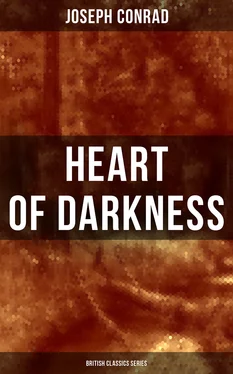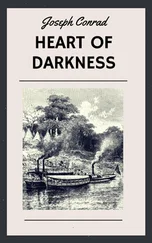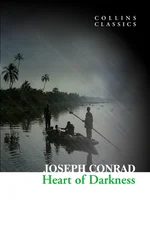“I am not disclosing any trade secrets. In fact, the manager said afterwards that Mr. Kurtz’s methods had ruined the district. I have no opinion on that point, but I want you clearly to understand that there was nothing exactly profitable in these heads being there. They only showed that Mr. Kurtz lacked restraint in the gratification of his various lusts, that there was something wanting in him — some small matter which, when the pressing need arose, could not be found under his magnificent eloquence. Whether he knew of this deficiency himself I can’t say. I think the knowledge came to him at last — only at the very last. But the wilderness had found him out early, and had taken on him a terrible vengeance for the fantastic invasion. I think it had whispered to him things about himself which he did not know, things of which he had no conception till he took counsel with this great solitude — and the whisper had proved irresistibly fascinating. It echoed loudly within him because he was hollow at the core . . . I put down the glass, and the head that had appeared near enough to be spoken to seemed at once to have leaped away from me into inaccessible distance.
“The admirer of Mr. Kurtz was a bit crestfallen. In a hurried, indistinct voice he began to assure me he had not dared to take these — say, symbols — down. He was not afraid of the natives; they would not stir till Mr. Kurtz gave the word. His ascendancy was extraordinary. The camps of these people surrounded the place, and the chiefs came every day to see him. They would crawl . . . ‘I don’t want to know anything of the ceremonies used when approaching Mr. Kurtz,’ I shouted. Curious, this feeling that came over me that such details would be more intolerable than those heads drying on the stakes under Mr. Kurtz’s windows. After all, that was only a savage sight, while I seemed at one bound to have been transported into some lightless region of subtle horrors, where pure, uncomplicated savagery was a positive relief, being something that had a right to exist — obviously — in the sunshine. The young man looked at me with surprise. I suppose it did not occur to him that Mr. Kurtz was no idol of mine. He forgot I hadn’t heard any of these splendid monologues on, what was it? on love, justice, conduct of life — or what not. If it had come to crawling before Mr. Kurtz, he crawled as much as the veriest savage of them all. I had no idea of the conditions, he said: these heads were the heads of rebels. I shocked him excessively by laughing. Rebels! What would be the next definition I was to hear? There had been enemies, criminals, workers — and these were rebels. Those rebellious heads looked very subdued to me on their sticks. ‘You don’t know how such a life tries a man like Kurtz,’ cried Kurtz’s last disciple. ‘Well, and you?’ I said. ‘I! I! I am a simple man. I have no great thoughts. I want nothing from anybody. How can you compare me to . . .?’ His feelings were too much for speech, and suddenly he broke down. ‘I don’t understand,’ he groaned. ‘I’ve been doing my best to keep him alive, and that’s enough. I had no hand in all this. I have no abilities. There hasn’t been a drop of medicine or a mouthful of invalid food for months here. He was shamefully abandoned. A man like this, with such ideas. Shamefully! Shamefully! I— I— haven’t slept for the last ten nights . . .’
“His voice lost itself in the calm of the evening. The long shadows of the forest had slipped downhill while we talked, had gone far beyond the ruined hovel, beyond the symbolic row of stakes. All this was in the gloom, while we down there were yet in the sunshine, and the stretch of the river abreast of the clearing glittered in a still and dazzling splendour, with a murky and overshadowed bend above and below. Not a living soul was seen on the shore. The bushes did not rustle.
“Suddenly round the corner of the house a group of men appeared, as though they had come up from the ground. They waded waist-deep in the grass, in a compact body, bearing an improvised stretcher in their midst. Instantly, in the emptiness of the landscape, a cry arose whose shrillness pierced the still air like a sharp arrow flying straight to the very heart of the land; and, as if by enchantment, streams of human beings — of naked human beings — with spears in their hands, with bows, with shields, with wild glances and savage movements, were poured into the clearing by the dark-faced and pensive forest. The bushes shook, the grass swayed for a time, and then everything stood still in attentive immobility.
“‘Now, if he does not say the right thing to them we are all done for,’ said the Russian at my elbow. The knot of men with the stretcher had stopped, too, halfway to the steamer, as if petrified. I saw the man on the stretcher sit up, lank and with an uplifted arm, above the shoulders of the bearers. ‘Let us hope that the man who can talk so well of love in general will find some particular reason to spare us this time,’ I said. I resented bitterly the absurd danger of our situation, as if to be at the mercy of that atrocious phantom had been a dishonouring necessity. I could not hear a sound, but through my glasses I saw the thin arm extended commandingly, the lower jaw moving, the eyes of that apparition shining darkly far in its bony head that nodded with grotesque jerks. Kurtz — Kurtz — that means short in German — don’t it? Well, the name was as true as everything else in his life — and death. He looked at least seven feet long. His covering had fallen off, and his body emerged from it pitiful and appalling as from a winding-sheet. I could see the cage of his ribs all astir, the bones of his arm waving. It was as though an animated image of death carved out of old ivory had been shaking its hand with menaces at a motionless crowd of men made of dark and glittering bronze. I saw him open his mouth wide — it gave him a weirdly voracious aspect, as though he had wanted to swallow all the air, all the earth, all the men before him. A deep voice reached me faintly. He must have been shouting. He fell back suddenly. The stretcher shook as the bearers staggered forward again, and almost at the same time I noticed that the crowd of savages was vanishing without any perceptible movement of retreat, as if the forest that had ejected these beings so suddenly had drawn them in again as the breath is drawn in a long aspiration.
“Some of the pilgrims behind the stretcher carried his arms — two shot-guns, a heavy rifle, and a light revolver-carbine — the thunderbolts of that pitiful Jupiter. The manager bent over him murmuring as he walked beside his head. They laid him down in one of the little cabins — just a room for a bed place and a camp-stool or two, you know. We had brought his belated correspondence, and a lot of torn envelopes and open letters littered his bed. His hand roamed feebly amongst these papers. I was struck by the fire of his eyes and the composed languor of his expression. It was not so much the exhaustion of disease. He did not seem in pain. This shadow looked satiated and calm, as though for the moment it had had its fill of all the emotions.
“He rustled one of the letters, and looking straight in my face said, ‘I am glad.’ Somebody had been writing to him about me. These special recommendations were turning up again. The volume of tone he emitted without effort, almost without the trouble of moving his lips, amazed me. A voice! a voice! It was grave, profound, vibrating, while the man did not seem capable of a whisper. However, he had enough strength in him — factitious no doubt — to very nearly make an end of us, as you shall hear directly.
“The manager appeared silently in the doorway; I stepped out at once and he drew the curtain after me. The Russian, eyed curiously by the pilgrims, was staring at the shore. I followed the direction of his glance.
Читать дальше












